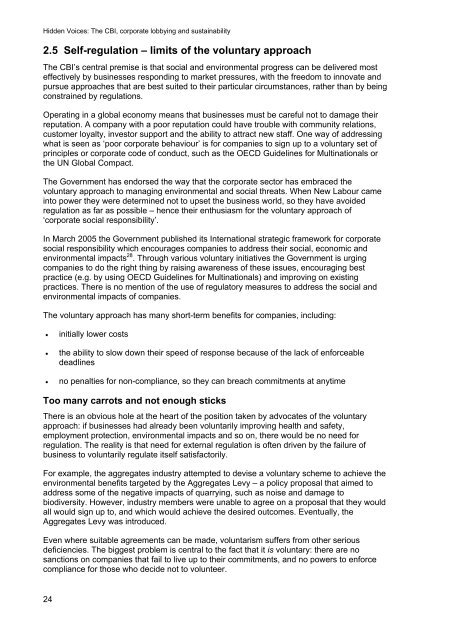hidden_voices
hidden_voices
hidden_voices
Create successful ePaper yourself
Turn your PDF publications into a flip-book with our unique Google optimized e-Paper software.
Hidden Voices: The CBI, corporate lobbying and sustainability2.5 Self-regulation – limits of the voluntary approachThe CBI’s central premise is that social and environmental progress can be delivered mosteffectively by businesses responding to market pressures, with the freedom to innovate andpursue approaches that are best suited to their particular circumstances, rather than by beingconstrained by regulations.Operating in a global economy means that businesses must be careful not to damage theirreputation. A company with a poor reputation could have trouble with community relations,customer loyalty, investor support and the ability to attract new staff. One way of addressingwhat is seen as ‘poor corporate behaviour’ is for companies to sign up to a voluntary set ofprinciples or corporate code of conduct, such as the OECD Guidelines for Multinationals orthe UN Global Compact.The Government has endorsed the way that the corporate sector has embraced thevoluntary approach to managing environmental and social threats. When New Labour cameinto power they were determined not to upset the business world, so they have avoidedregulation as far as possible – hence their enthusiasm for the voluntary approach of‘corporate social responsibility’.In March 2005 the Government published its International strategic framework for corporatesocial responsibility which encourages companies to address their social, economic andenvironmental impacts 28 . Through various voluntary initiatives the Government is urgingcompanies to do the right thing by raising awareness of these issues, encouraging bestpractice (e.g. by using OECD Guidelines for Multinationals) and improving on existingpractices. There is no mention of the use of regulatory measures to address the social andenvironmental impacts of companies.The voluntary approach has many short-term benefits for companies, including:• initially lower costs• the ability to slow down their speed of response because of the lack of enforceabledeadlines• no penalties for non-compliance, so they can breach commitments at anytimeToo many carrots and not enough sticksThere is an obvious hole at the heart of the position taken by advocates of the voluntaryapproach: if businesses had already been voluntarily improving health and safety,employment protection, environmental impacts and so on, there would be no need forregulation. The reality is that need for external regulation is often driven by the failure ofbusiness to voluntarily regulate itself satisfactorily.For example, the aggregates industry attempted to devise a voluntary scheme to achieve theenvironmental benefits targeted by the Aggregates Levy – a policy proposal that aimed toaddress some of the negative impacts of quarrying, such as noise and damage tobiodiversity. However, industry members were unable to agree on a proposal that they wouldall would sign up to, and which would achieve the desired outcomes. Eventually, theAggregates Levy was introduced.Even where suitable agreements can be made, voluntarism suffers from other seriousdeficiencies. The biggest problem is central to the fact that it is voluntary: there are nosanctions on companies that fail to live up to their commitments, and no powers to enforcecompliance for those who decide not to volunteer.24


